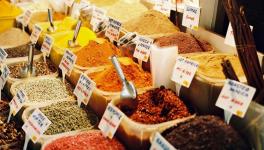Pakistan’s Food Crisis Continues, 11 Die in Stampedes
Police try to control the people gathered at a free flour distribution centre. (Photo: White Star / M. Arif via Dawn)
People were already struggling to get free flour from government distributors when stampedes led to the killing of 11 people in four districts of Pakistan’s Punjab province.
In the latest incident, on March 28, two elderly women and one man were killed in different stampede accidents in southern Punjab, while 60 others were injured, as per The Indian Express. Desperate people had been waiting in long queues outside government shops in Faisalabad, Multan, and Jehanian, when they were baton-charged by the police, leading to chaos.
A prolonged political and economic crisis in Pakistan has given rise to an acute shortage of basic commodities. Food prices in the country have risen for the eleventh consecutive month and inflation is at over 47%, according to the Pakistan Bureau of Statistics.
Factors like increasing fuel prices, rising energy costs, and the devaluation of the Pakistani Rupee have made life unbearable for the poorest in the country. The prices of staple wheat flour have reportedly increased 120% year-on-year. The prices of wheat flour are reportedly at an all-time-high, pushing weekly inflation up 1.8% week-on-week during the seven day period that ended on March 23, Geo News reported.
An estimated 80% of Pakistan’s crops were damaged in last year’s flooding, which submerged one-third of the country. While the country was still reeling under the fallout of the devastating floods, foreign exchange reserves in the State Bank of Pakistan fell to their lowest in March, at US$ 4.6 billion, sufficient only to bear the cost of one month of imports.
The national currency has seen a devaluation of 54% in the last 12 months. The rate of inflation is also much higher than neighboring Bangladesh (8.6%), India (6.5%), and Afghanistan (5.2%), as per the latest report by the World Food Programme (WFP).
According to the WFP report, the prices for staple cereals, pulses, and non-cereal food commodities continue to increase. In January 2023, compared to June 2022, the price of onions had increased by 220%, wheat flour by 74%, rice by 68%, pulses by 65%, and milk by 39% in markets serving flood-affected areas, the report said. Similarly, the price of cooking gas increased by 8% and the price of petrol also increased by 11.1%.
“The price of wheat and wheat flour has continued to increase in the country due to various factors including the tight supply of private wheat, hoarding, and profiteering,” the report concluded.
Meanwhile, the government of Prime Minister Shehbaz Sharif has been accused of looting the country’s economy and failing to tackle the current crisis. The government also finds itself cornered as it attempts to strike a balance in the negotiations over external financing assurances and austerity measures laid down by the IMF before it can receive the next tranche of the US$ 6.5 billion bailout package that the country secured in 2019.
Get the latest reports & analysis with people's perspective on Protests, movements & deep analytical videos, discussions of the current affairs in your Telegram app. Subscribe to NewsClick's Telegram channel & get Real-Time updates on stories, as they get published on our website.
























